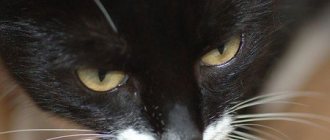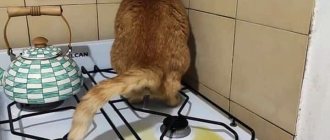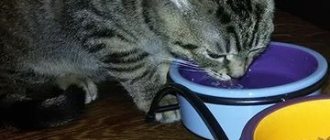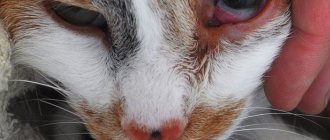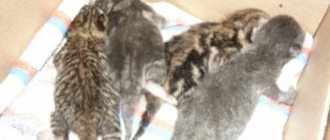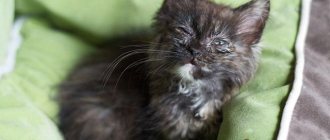What are vibrissae?
To understand how important whiskers are for a kitten, let's try to figure out why he needs them. Literally, vibrissae means “to vibrate.” If you take a closer look at the cat, you will notice that they vibrate from the objects that it touches.
Each antennae is an independent organ of touch that is connected to the brain. Vibrissae are located in the skin three times deeper than the bristles and are surrounded on all sides by nerves through which information is transmitted to the pet’s brain.
Each antenna transmits information to its corresponding area of the cerebral cortex. That is why, it is necessary to pay special attention to the factor of loss of whiskers by the cat, since he is temporarily unprotected from the outside world.
The vigilant owner saw a broken mustache - what does this mean?
You probably heard in childhood that a cat with its whiskers cut off stops “smelling” or loses its sense of smell. This myth is actually reflected in the animal's loss of orientation. Whiskers - they are also called vibrissae - serve to spatially determine position. It is a fact that a cat, cat or kitten can use its whiskers to decide whether it will fit into a hole or a crack. It happens that this feeling fails them, and in the end they have to rescue the pet from trouble.
At the same time, thickening or excessive length of the mustache leads to deterioration of vision.
Some breeds (hairless, such as elf, sphinx, bambino) do not have whiskers at all; this is a normal phenomenon associated with genetic predispositions.
It is believed that the broken mustache has “served” its purpose and is replaced by a new one that has grown again. This occurs in sexually mature pets, accompanying molting, and is not considered an abnormal phenomenon. If the process begins to develop too intensively, and growth of the mustache is not observed, it is worth paying attention and establishing the causes of the pathology.
Why does a cat need a mustache?
A cat's whiskers perform three important functions:
- Hunting. Of course, not all domestic cats hunt mice, but it is with the help of their whiskers that they determine how safe their meal is. They sense with their whiskers whether food is hot or cold. When a cat loses its whiskers, it is sometimes forced to touch food with its paw.
- Orientation. With the help of whiskers, the cat navigates in space; they help the pet move in complete darkness and silence. He touches objects with his mustache, thereby determining what is in front of him.
- Communication. An experienced owner, by the location of the whiskers, will understand whether the pet is in the mood for communication, this is especially true during the mating period. If the antennae are forward, then the cat is not averse to communicating; when they puff up, then he is clearly not in the mood for close communication. When a cat's whiskers are pressed to its face, it is clearly frightened or the company is unpleasant to him. With its whiskers down, the cat is ready to play.
What diseases lead to the loss of vibrissae?
Those who want to understand why a kitten's whiskers break should be aware that the root of this problem may lie in health problems of the pet.
An animal may begin to lose its whiskers if it is diagnosed with a food allergy. In such cases, not only the mustache, but also the hair may fall out. To get rid of these symptoms, you need to contact a veterinarian and undergo all tests to identify the allergen.
Hypothyroidism can also cause mustache loss. This disease usually affects older animals. It leads to disruption of metabolic processes occurring in the cat's body. Typical symptoms of hypothyroidism include loss of whiskers and fur, hyperactivity and increased appetite. In some cases, this disease may be accompanied by vomiting, diarrhea and weight loss. If you notice one or more of the above signs, you should immediately consult a veterinarian. The specialist will prescribe a series of examinations, based on the results of which it will be possible to select the appropriate treatment.
Whiskers may also fall out if the cat has a disease that weakens the immune system.
Why do mustaches break?
There are not many reasons to help you understand why your pet’s whiskers break:
- The main reason is the kitten's unbalanced diet. The animal must receive all the substances necessary for full functioning.
- Physiology can help answer the question of why kittens' whiskers break off. All kittens that have reached the so-called “transitional” age, at a certain period, their antennae break and fall out. At this time, consultation with a veterinarian is important, as you need to help your pet cope with the load.
- Another answer to the question of why a cat’s whiskers are damaged is the presence of a fungal infection.
- The presence of helminths also leads to a similar problem.
- Sometimes such questions arise when the animal does not fully absorb the minerals and vitamins in the feed. This is due to a violation of the mineral balance in the kittens’ body.
Psychological problem
If there are several animals in the house, and the kitten that is losing its whiskers is apparently healthy and receives high-quality food, then most likely the answer to the question of why the pet’s antennae break off lies in the relationship between the individuals:
- By breaking each other's whiskers, they thereby demonstrate their superiority. This kind of struggle for leadership needs to stop. The owner must show the pets his disagreement with this situation.
- If the cat and kitten are not separated in a timely manner, then she, breaking off his whiskers, shows who is boss in the house.
- Often a kitten's antennae are damaged while playing with children, in which case it is necessary to talk to the kids about the importance of this organ.
- Sometimes owners trim their pet's whiskers for beauty. This should never be done, even if the cat never goes outside. The poor thing is under a lot of stress at this time.
Mustache care
The kitten's eyes do not open: the main reasons and what can be done
There are no special mustache care procedures. The place where they fall out or break does not need to be processed, as well as any other procedures. However, there are a number of manipulations that definitely should not be done.
Do not pull out, break or trim your mustache. Even if there is a suspicion that they are too long or the cat is uncomfortable walking with them, removing the whiskers and violating their integrity is prohibited. In addition, the rule that if you trim the whiskers, they will grow longer in the future - this is fundamentally wrong.
The loss of 1-2 antennae is not dangerous for a kitten and is natural. In other cases, you should take a careful look at the animal and try to find the reason for the massive loss of its senses of touch. If there are accompanying symptoms, as well as suspicions of the presence of disease or parasites, you should consult a veterinarian. An examination and tests will help identify the cause of the loss or deterioration of the kitten’s whiskers.
What to do if your cat's whiskers break off
In order for a cat to walk around with a rich mustache, you need to follow some simple rules:
- The food should be rich in vitamins and minerals. The lack of any element leads to the loss of vibrissae, that is, they can either be broken off or shortened.
- It is better to feed kittens natural food, because it better meets the needs of his body. You can add eggs and vegetable oil to his diet.
- The body of a teenage kitten needs additional calcium, phosphorus, and vitamins. In order to help your pet, you need to consult a veterinarian; you should not select the drug and dosage for the animal yourself, because this can harm it. As a rule, during this period the veterinarian prescribes Omega-3, vitamins A and D, and calcium.
- If the pet receives ready-made high-quality food, then it does not need additional intake of vitamins and microelements.
- To solve the problem associated with the loss of whiskers, you need to be tested by a veterinarian for the presence of a fungal infection. If it is confirmed, then after being treated with the prescribed medications, you can forget about such a nuisance.
- It is also necessary to take tests for the presence of helminths; if they are confirmed, the veterinarian will prescribe the necessary medications.
- If a cat has problems with mineral imbalance, the veterinarian can prescribe the drug Gamavit, which can be given by injection or given to the animal.
If the owner takes care of the kitten in a timely manner, selects a balanced food for it, checks for the presence of a fungal infection and excludes psychological problems, then over time the broken whiskers will grow back and the pet will be able to calmly navigate in space.
Animal without whiskers
Before you start to figure out why a kitten's whiskers break, it should be noted that regular changes of whiskers are inherent in nature. This process occurs gradually. Usually the whiskers fall out one at a time, and this is considered normal. Don't panic if you notice that your pet is missing a pair of whiskers.
But if an animal begins to suddenly lose its whiskers without replacing them with new ones, then a serious malfunction has occurred in its body. In this case, the pet loses the ability to adequately perceive the surrounding world with all its dangers. Such a cat should not be allowed outside, otherwise it may die.
However, we should not forget that there are some breeds that have no whiskers at all. In this case, this is considered the norm and does not interfere with the animals’ ability to freely navigate in space. In particular, we are talking about sphinxes.
Why is losing a mustache dangerous?
The base of the vibrissae is located in the upper layer of the skin, and their roots are in a blood vesicle called the lacuna. The cat's whiskers are supplied with blood; branches of the facial nerve “lead” to them. The whiskers track the slightest fluctuations in the external environment and transmit signals to the animal’s brain, working as a full-fledged sensory organ.
A cat that has lost its whiskers will not die, but orientation in space and in the dark will be very difficult for it. If the animal is on a self-walk, then such walks become hazardous to health and can even threaten the lives of cats that have lost all their whiskers.
Pay attention to exactly how the cat loses its whiskers:
- with the natural change of vibrissae, they fall out one at a time, the long ones remain in place;
- in case of mechanical damage, the damaged mustache is noticeable, and the broken part is located somewhere later;
- With the possible development of the disease, several vibrissae fall out at once, and the remaining ones look thin and weak.
When is mustache breakage natural?
First of all, overly worried owners should understand that whiskers - or whiskers, as they are scientifically called - can fall out naturally. This process is as natural as cat or dog shedding, and there is nothing to be afraid of. Vibrissae are coarse hairs that also need to be renewed every few months. After some time, a new one will grow in place of the fallen hair. However, if a cat's whiskers break off, then this should already be a cause for concern, and it is better for the owner to eliminate the cause.
© shutterstock
Sometimes a cat has no whiskers. There are several reasons here:
- If the cat is a Sphynx breed, then the absence of whiskers is normal. Also, some other breeds hybrid with the Sphynx may also lack mustaches. At the same time, some individuals may have mustaches, and in this case, cutting them off is strictly prohibited;
- Due to curiosity, the kitten's whiskers break very often. Sometimes they get a little shorter because the desire to explore all the places doesn't always end well. Sometimes the whiskers break at the root - the cat, wanting to calm her baby, bites the whiskers;
- breaking of whiskers can occur as a result of dominance of another cat in a peculiar tribe.
All these cases are natural and there is no need to worry. After some time, the broken mustache will grow back.
How to prevent your mustache from falling out
For a thick mustache, follow these recommendations:
- You can't trust cheap food . An unclear composition, at best, will simply not bring any benefit, and at worst, it will cause food intolerance and destroy the immune system.
- Stick to your parasite treatment schedule . Remember to use anthelmintic drugs.
- Process raw meat and fish before serving . Heat treatment will destroy worm eggs.
- Avoid competition for leadership . Protect the kitten from aggression from older family members.
- Be sure to include vitamins in your diet when feeding naturally.
- Strictly monitor the amount of water consumed when dry feeding. Lack of fluid can lead to the development of urolithiasis.
- Visit your veterinarian for preventative purposes at least once a year.
Never trim your cat's whiskers. Any length that seems excessive is suitable for this member of the family.
In conclusion, I note that the mustache is an important organ, the condition of which must be carefully monitored. Follow these tips and try to avoid causes that can harm your cat's whiskers.
